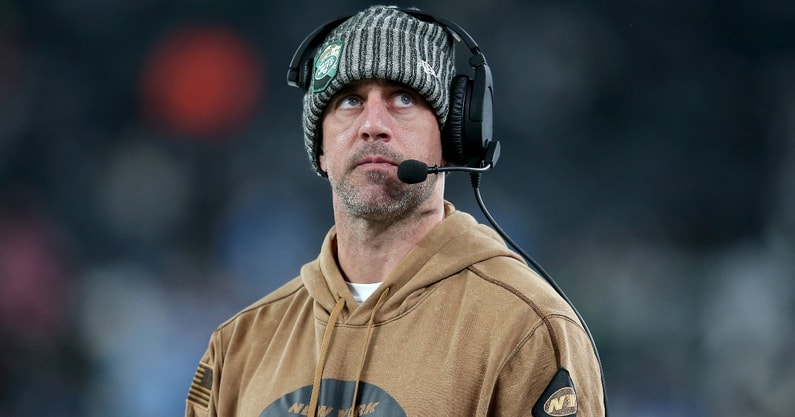Aaron Rodgers explains why he rejected Robert F. Kennedy Jr.'s vice president bid

Speaking with reporters at New York Jets OTAs on Tuesday, quarterback Aaron Rodgers offered one simple reason why he wouldn’t have accepted an offer to be a vice presidential candidate for independent candidate Robert F. Kennedy Jr.: He doesn’t want to retire yet.
Rodgers, who was reportedly in contention for the job earlier in 2024, would inevitably need to retire from his job as a starting NFL quarterback to be able to fulfill the duties of the vice presidency, largely presiding over the Senate and making public appearances. And Rodgers, coming off a torn Achilles tendon that ended his 2023 debut season with the Jets after just a few plays, has been on the warpath to make a successful return to the field.
“I love Bobby,” Rodgers said during a press conference. “We had a couple of really nice conversations but there were really two options: retire and be his VP, or keep playing. I wanna keep playing.”
However it doesn’t seem that the quarterback, who has not been shy to share his beliefs publicly, would turn down future overtures about going into politics.
Rodgers was reported to be one of several candidates to be RFK Jr.’s running mate
Rodgers was apparently a potential choice as the running mate for independent candidate Robert F. Kennedy Jr. Along with Rodgers, the campaign is reportedly also vetting former Minnesota governor, Navy SEAL and WWE wrestler Jesse Ventura.
Both Rodgers and Ventura have been receptive to the overtures. Kennedy and Rodgers have been speaking “pretty continuously” for the last month, according to the New York Times.
Rodgers, who tore his Achilles tendon four plays into his New York Jets tenure last September, is in line to be the Jets starting quarterback this upcoming season. It will be the second season of a two year, $75 million deal that Rodgers inked with the Jets after the franchise traded multiple draft picks to the Green Bay Packers for the quarterback prior to the 2023 season.
Top 10
- 1New
Shedeur Sanders reacts
To going undrafted in 1st round
- 2
Picks by conference
SEC, Big Ten dominate NFL Draft
- 3Hot
Joel Klatt calls out
'Trash' Shedeur Sanders narrative
- 4
10 Best Available Players
After NFL Draft 1st Round
- 5Trending
ESPN roasted
For Shedeur Sanders empty couch
Get the On3 Top 10 to your inbox every morning
By clicking "Subscribe to Newsletter", I agree to On3's Privacy Notice, Terms, and use of my personal information described therein.
Kennedy initially tried to run as a Democrat and a primary challenger to incumbent Joe Biden, but was generally rejected by the party and its electorate, and opted to change and run as an independent in October 2023. He and Rodgers shared political common ground on at least one issue: Vaccine skepticism.
That belief was amplified, in Rodgers’ case, during the Covid-19 pandemic.
Rodgers infamously said he was “immunized” and seemed to have skirted some amount of NFL protective protocol for unvaccinated players, which he was at the time. Rodgers has since struck out to cast himself as open-minded, unorthodox and intellectual. He piqued interest with his darkness retreat and sharing that he’s used ayahuasca in the past, and also sparked outrage with his comments linking late-night host Jimmy Kimmel to alleged sex-trafficker Jeffrey Epstein on the Pat McAfee Show.
Rodgers made those comments about Kimmel days before he stood before a collection of reporters and explained how exit interviews were a chance for the Jets to “flush the bulls***” after a season that fell flat.
“If you want to be a winning organization and put yourself in position to win championships and be competitive, everything that you do matters. And the bulls*** that has nothing to do with winning needs to get out of the building. So that’ll be the focus moving forward,” Rodgers said then, in early January.